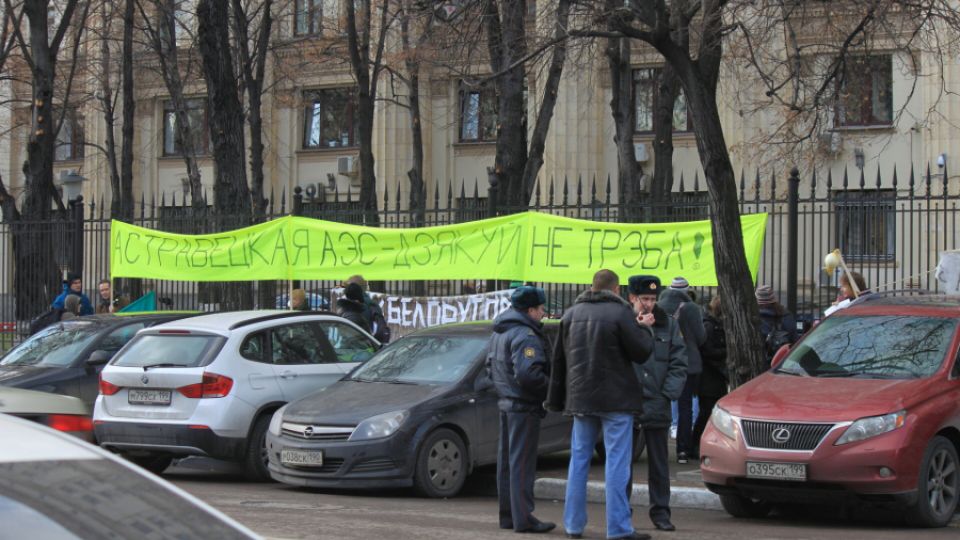Belarus has withdrawn from the international Aarhus Convention [1] on Environmental Democracy after president Alyaksandr Lukashenka decides to do so by issuing a decree. The authoritarian regime is thus responding to long-standing criticism from the international community over the persecution of environmentalists. The unprecedented step is the first case of a signatory state withdrawing from the Convention. The action will undoubtedly bring further deterioration to the country’s active citizens. They have thereby lost international protection of their right to participate in decisions about the places where they live.
“Belarus was one of the first signatories to the Convention in 1998. At that time, it seemed that the country was gradually moving from the Soviet marasmus back to Europe, and the state’s regard for human rights, health, and the environment would increase. The withdrawal of Belarus from the Aarhus Community is, unfortunately, one of the next steps on the road back to the Soviet era,” comments Martin Skalský from Arnika, who has long been involved in legal aspects of environmental protection.
How do Belarusians justify their decision? “Despite the results achieved in fulfilling the international obligations assumed in the relevant area, in October 2021 Belarus faced a biased and discriminatory attitude on the part of the governing bodies of the [Aarhus] Convention, so there was pressure on the sovereign state. Under current conditions, full participation of Belarus in the Convention is impossible. Withdrawal from the Convention will not prevent improving the national cooperation system between state authorities and the population in environmental policy. Within the framework of the Belarusian legislation, further work will continue to ensure the implementation of the rights of citizens and their associations to information, participation in the decision-making process, and access to justice in environmental issues,” president Lukashenko’s office explained in a press release. The “pressure” refers to a last year’s statement by other signatories to the Convention, which called on Belarusian state institutions to stop persecuting environmental activists and NGOs. Otherwise, the country will lose some rights the Convention guarantees, such as the right to chair its bodies.
“In a country where authorities do not respect basic human rights, we cannot talk about the right to a healthy environment. There is also where no freedom of speech as independent media are banned. Furthermore, the state has liquidated over 800 NGOs and has imprisoned 1 254 people for political reasons. In a free Belarus, a democratically elected government would be honored to return us to the list of countries that subscribe to the principles of environmental democracy and respect them,” says Maryna Dubina of Ekodom, an NGO that was recently closed down by the state authorities as hostile.
Ekodom stands not only at the end of the story but also at the beginning. The NGO filed a complaint with the Aarhus Convention Compliance Committee about the systematic persecution of environmental activists who have been protesting against the construction of the Astravets nuclear power plant since 2012 (see cover photo). Although the people of Belarus still suffer the severe consequences of the Chernobyl accident, the government decided to silence the protests, and the police beat and arrested people. The result of the 2021 investigation was that the state did indeed systematically persecute environmentalists, leading to the chain of events described above.
After the fraudulent presidential elections in 2020, the state began a wholesale liquidation of opponents of the totalitarian regime. These opponents included the NGO movement, which is why over 70 environmental NGOs - including Ekodom - were closed down, property confiscations and liquidation fines were imposed, and thousands of people were forced to flee the country. President Lukashenko’s government has never acknowledged the findings of the international inquiry, denies the persecution of activists to this day, and has preferred to withdraw from the Aarhus Convention for fear of further international criticism.
Sources:
You can find the notice of withdrawal in the UN Secretary-General’s depository here: https://treaties.un.org/doc/Publication/CN/2022/CN.259.2022-Eng.pdf
Ecodom’s press release on Belarus’ withdrawal from the Aarhus Convention: https://ecohome.ngo/eshhe-odin-shag-v-sovetskoe-proshloe-shto-dlya-belarusi-znachit-vyhod-iz-orhusskoj-konventsii
Press release from the apparatus of President Alyaksandr Lukashenka on the same: https://president.gov.by/ru/events/belarus-prekrashchaet-uchastie-v-orhusskoy-konvencii
We also wrote about the persecution of environmental activists in Belarus here: https://arnika.org/en/news/belarus-should-stop-persecuting-environmental-activists-unece-countries-insist
For specific cases of persecution of activists from Belarus and other countries, see our website: https://stop-persecution.org/
Notes:
[1] The first signatories signed the Aarhus Convention on June 25, 1988, due to the Fourth Ministerial Conference of the United Nations Economic Commission for Europe “Environment for Europe” in the Danish city of Aarhus. To date, 47 countries from Europe and Central Asia have ratified it. Following the withdrawal of Belarus, the number of signatories is 46. The Convention obliges the Member States to make information on the state of the environment and its impact on the population’s health actively and fully available to citizens. States must also ensure that everyone can participate equally in decision-making on projects that significantly impact the environment and be involved in developing plans and policies. Finally, it gives citizens the right to judicial protection when authorities violate the Convention’s standards. The Aarhus Convention is considered the most crucial document of its time. It combines environmental rights with civil rights and is an instrument for deepening democracy.







